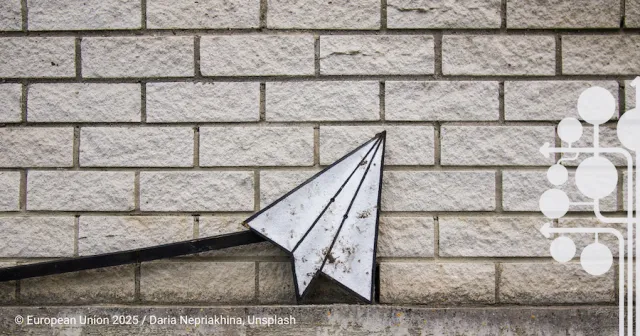EPALE online discussie over synergie tussen onderwijs en beleid: de vicieuze cirkel van armoede doorbreken

Op woensdag 18 december 2024, van 10u tot 16u CET, organiseert EPALE de online discussie “Onderwijs en beleidsynergieën: het aanpakken van armoede in moderne samenlevingen”.
De discussie begint met een live-streaming met Elisabeth De Vleesschauwer van GO! Brussel en Mathis Porchez, economisch en beleidsanalist bij het directoraat-generaal Werkgelegenheid, sociale zaken en inclusie (DG EMPL) van de Europese Commissie; de discussie wordt gemodereerd door de European Association for the Education of Adults (EAEA).
De livestream wordt gevolgd door een schriftelijke discussie, met bijdragen van EPALE-gebruikers.
Waarover gaat het?
Deze discussie verkent de belangrijke verbinding tussen onderwijs en beleid bij het aanpakken van armoede. We richten ons op innovatieve strategieën en initiatieven vanuit de gemeenschap die duurzame verandering stimuleren.
Neem deel aan deze betekenisvolle dialoog over het creëren van een meer rechtvaardige samenleving. Deel je gedachten, ervaringen en oplossingen en help mee aan het ontwikkelen van impactvolle strategieën tegen armoede.

Commentaar
Parental education effect
The recent PIAAC 2023 survey on adult skills results revealed (see OECD report on PIAAC 2023) that many adults across OECD countries taking part in the survey score on average at Level 1 or below in the proficiency scales: 26% in literacy, 25% in numeracy and 29% in adaptive problem solving. Survey also revealed that adults with highly educated parents have better literacy skill levels than those with less educated parents. Namely, adults with highly educated parents outscored those with low-educated parents by 50 points in literacy, 49 points in numeracy and 42 points in adaptive problem solving, on average. In some countries, the gaps were especially large, in some countries increases were recorded in the socio-economic gap in literacy among 16-24 year-olds.
It is believed that parents from non-supportive backgrounds are hindered in taking care of family literacy due to two essential key factors: low social capital and low skills. At the same time, the educational systems are not successful in overcoming the differences in the social capital.
So, the question is what can be done regarding the parental education effect in order to create more equitable and fair education?
- Login of registreer om te reageren
Discussion's page
Dear @Estera MOŽINA
Thanks so much for your comment. Please follow the streaming and the discussion in written form at this link: https://epale.ec.europa.eu/en/discussions/education-and-policy-synergies-breaking-cycle-poverty
See you there :)
Sara - EPALE Team
- Login of registreer om te reageren
- Login of registreer om te reageren





Poverty in Portugal The…
Poverty in Portugal
The National Statistics Institute, based on the Living Conditions and Income Survey (ICOR) carried out in 2023, recently revealed that poverty has increased in Portugal. It rose by 0.6 percentage points (pp), from 16.4 per cent in 2021 to 17.0 per cent in 2022. In 2022, 1.781 million people had incomes below the poverty line.
In addition, the worsening of poverty among children and young people was more significant than among the population as a whole, with the poverty rate among the under-18s rising from 18.5 per cent to 20.7 per cent. In 2022, around 346,000 children and young people lived in poor families.
Significant increases in the level of poverty are also visible in particularly vulnerable groups. The poverty rate among single-parent families increased by 3.2 pp, among the unemployed by 3.3 pp and among other inactive people by 3.4 pp.
In educational terms, our situation is not good either. The recent PIAAC results showed very poor performance in all three dimensions: literacy, numeracy and problem-solving.
In my opinion, we need new approaches and very quickly!